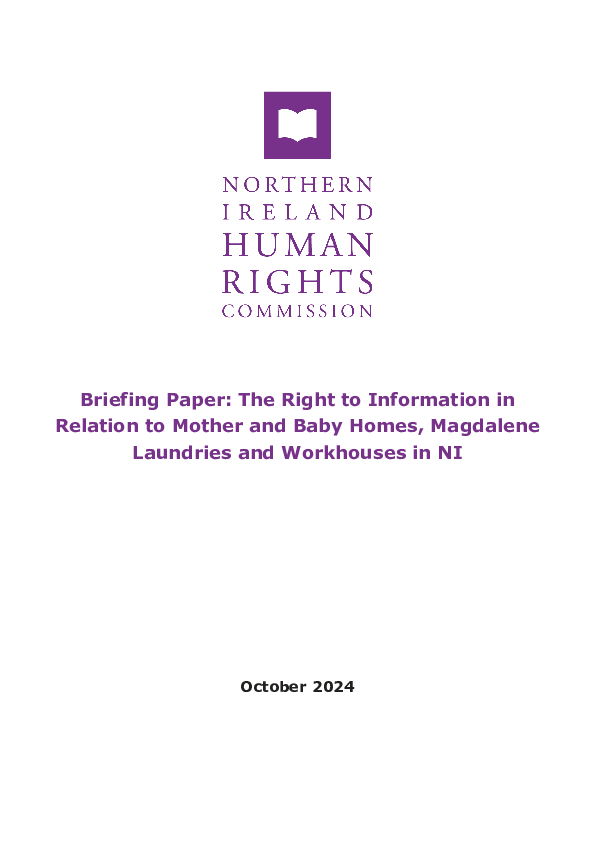NIHRC Briefing Paper: The Right to Information in Relation to Mother and Baby Homes, Magdalene Laundries and Workhouses in NI
Date produced: October 2024
Below is a summary of the Northern Ireland Human Rights Commission's (NIHRC) recommendations and messages.
You can also download the full document through the links provided.
Summary recommendations/messages
2.8 The NIHRC recommends that the Executive Office ensures that the right to truth is carefully considered at every stage of the proposed inquiry into Mother and Baby Institutions, Magdalene Laundries and Workhouses in NI. This is for the purposes of establishing the perpetrators, understanding the circumstances or reasons that led to the alleged abuses and human rights violations, and providing access to an effective remedy. This extends to victims, survivors, relatives and, as appropriate, broader society. It requires a gender-sensitive, victim-centred, trauma-informed approach.
2.9 The NIHRC recommends that the Executive Office ensures that the right to truth is carefully considered in terms of what happens to the information gathered and findings made after the public inquiry is concluded, particularly in the context of ensuring that any violations that occurred do not happen again.
2.21 The NIHRC recommends that the Executive Office ensures that access to information regarding Mother and Baby Institutions, Magdalene Laundries and Workhouses is only limited where it is lawful, proportionate and necessary to do so. This includes ensuring that there is a clear structure and statutory guidance for indexing, facilitating, managing, restricting and monitoring access to information. Also, that there is an accessible, robust and human rights compliant complaints mechanism in place to challenge decisions regarding access to information.
2.29 The NIHRC recommends that the Executive Office ensures that effective steps are taken to strike the appropriate balance between the right to respect for private and family life of an individual seeking to maintain their privacy and an individual seeking to access information regarding Mother and Baby Institutions, Magdalene Laundries and Workhouses in NI. This requires establishing what is proportionate, taking into account the surrounding circumstances of the individual request.
2.30 The NIHRC recommends that the Executive Office ensures that effective steps are taken to ensure that individuals are able to ascertain who has control or may have control of their personal data regarding Mother and Baby Institutions, Magdalene Laundries and Workhouses in NI, including their pathways and practices. This could be achieved by indexing the information gathered during the public inquiry and archiving this after the inquiry, with a clear system in place to enable queries and access, as appropriate, to the index and the information held.
2.43 The NIHRC recommends that the Executive Office ensures that effective mechanisms are in place to consider and balance the interests in protecting the privacy of individuals and enabling individuals to have timely access to essential information about risks to their health. This requires individualised assessment of proportionality, including consideration of the individual circumstances surrounding the individual request for information.
2.49 The NIHRC recommends that the Executive Office ensures that the public inquiry into mother and baby homes, Magdalene Laundries and Workhouses in NI has effective powers of compellability that are clearly set out. Balanced with the requirement to conduct a thorough investigation, this includes that a victim-centred approach is adopted regarding who can be compelled to provide evidence and the type of information that can be compelled.
2.62 The NIHRC recommends that the Executive Office ensures that there is a process for archiving the evidence and information sources recovered and collated by the Expert Panel, Truth Recovery Independent Panel and public inquiry. Access and publication should only be limited where it is lawful, proportionate and necessary to do so. This should include introducing and monitoring safeguards to ensure that any limits to access are not applied arbitrarily and that the commitments aimed at enabling effective public scrutiny are not illusory. There should also be measures in place to ensure that the process for providing and accessing evidence and information is transparent and fully accessible during and after the public inquiry. These mechanisms should be developed, implemented and monitored through meaningful consultation with victims, survivors, their relatives and representative organisations, with consideration of victim-centred and gender-sensitive approaches, particularly with a view to preventing re-traumatisation or re-victimisation.
2.66 The NIHRC advises the Committee for the Executive Office that the human rights requirements regarding access to information in the context of Mother and Baby Institutions, Magdalene Laundries and Workhouses can be far-reaching. They apply to public authorities, but can also extend directly to private individuals and bodies in certain circumstances.
3.20 The NIHRC recommends that the EU Victims Directive, the EU Charter of Fundamental Rights and related caselaw, are carefully considered in the development of legislation for a public inquiry, to ensure that provisions comply with minimum requirements set out.
Click here to open: Briefing Paper

Download Documents
Your browser is out-of-date!
Update your browser to view this website correctly. Update my browser now